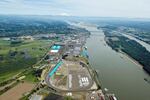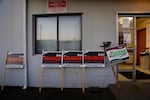On a recent Saturday morning, a dozen people crowded a small apartment in central Vancouver, Washington. They were filling up on bacon and eggs before a day of canvassing the neighborhood.
Related: Vancouver Port Commissioner Race On Pace To Hit $1 Million
“We got toast, we got orange juice,” Don Orange said.
In his kitchen, a stack of dirty dishes started to pile up in the sink.
“I was a short order cook when I was in high school. So, this is actually fun for me,” Orange added. “But I don’t know about the cleanup.”
Orange is running for the closely watched Vancouver Port Commission seat. And from his apartment kitchen, his grassroots campaign may look like many before it.
But this race is unlike any other. The future of a multi-million dollar oil terminal at the port hangs in the balance. And that’s made things personal in this close-knit community.
Orange grew up across the Columbia River in Northeast Portland, but for the past 30 years, he’s raised his family in Vancouver. He’s the owner of Hoesly Eco Automotive, a local mechanic shop off the main drag downtown.

Don Orange is a candidate for Vancouver Port Commissioner District 1. On a recent morning, Orange had a breakfast meeting at his home with volunteers and campaign organizers.
Molly Solomon / OPB
Orange has become a familiar face in recent years at the Port of Vancouver board meetings and has rarely missed an opportunity to speak out against the proposed Vancouver Energy oil terminal. A couple years ago, he helped organize Vancouver 101, a group of small businesses that oppose the project.
Like a lot of things in this election, nothing has escaped scrutiny. Orange recently had to hire an attorney to address claims he didn’t actually live at the apartment he started renting in mid-March. In order to run for the Port District 1 seat, Orange has to reside within the district limits.
The county auditor ended up dismissing the challenge, and a case in the courts was also dropped. But Orange said these tactics and personal attacks have put pressure on his campaign.
“It’s stressful for me when people question my integrity or my character,” said Orange. “It’s not fun.”
Oil giants Tesoro-Savage are behind the $210 million Vancouver Energy project. They say the terminal would ship 360,000 barrels of oil daily from the Bakken region in the Midwest. The oil would travel through the Columbia River Gorge to Vancouver by rail. From there, it would be loaded onto ships bound for West Coast refineries.

Port commissioner candidate Don Orange is a familiar face at port meetings and has testified several times against the Vancouver Energy oil terminal.
Molly Solomon / OPB
If elected, Orange could shift the power of the three-member port commission board against the project for the first time. That outcome could spell the end of the terminal.
“This is a choice of what our economy should look like,” said Orange. “It is a choice of having a vibrant small business economy or becoming a big oil town.”
Orange’s campaign is largely funded by individuals, with the average gift hovering around $140.
Recently, he’s gotten more than $250,000 of in-kind donations from the environmental political arm Washington Conservation Voters.
The group says that’s largely to keep Orange in the race and to offset massive donations to his opponent, Kris Greene.
“In Clark County, I would argue this is a lot bigger than just the environmental community,” said Washington Conservation Voters president Shannon Murphy, who noted the local chapter of the International Longshore and Warehouse Union and the local firefighter’s union have both endorsed Orange.
“It’s lots of different folks standing up and saying they see a better future for Vancouver,” Murphy said.
The organization also gave a sizable amount to current commissioner Eric LaBrant’s 2015 campaign, about $100,000 of in-kind contributions.
A Greene Campaign
Port commission candidate Kris Greene currently boasts one of the largest campaign war chests in the state, much of it coming from "Big Oil."
This race is Greene’s first foray into politics. He’s lived in Vancouver with his family for the past 20 years and works as a local State Farm insurance agent in east Vancouver.
So far, Greene has raised nearly $600,000, with 87 percent coming from Vancouver Energy and backers of the project.

Port of Vancouver District 1 Candidate Kris Greene.
Molly Solomon / OPB
Together, Greene and Orange have raised nearly $1 million, breaking the record for the most expensive port race in recent state history.
“Tesoro has been in our community for over 35 years. They’re our partners, and I believe I should accept that money,” Greene said. “They like my platform, and they like that I’m not a single-issue candidate. That money will allow me to get that message out.”
Even with all the money flowing into his campaign, Greene denies he has made up his mind on the oil terminal. Instead, he says he wants the terminal proposal process to play out. That’s not to say he hasn’t had ties to the terminal in the past.
Before running for the port seat, Greene served on Vancouver Energy’s Community Fund Advisory Board and wrote a positive post on the company’s website. He also sent an email in March, before announcing his candidacy, with the subject line, “I Support the Oil Terminal at the Port Of Vancouver.”
“I am my own man. I’m not in anybody’s pocket,” Greene told OPB, stressing that if he’s elected he would not have a conflict of interest.
‘Buying Themselves Democracy’
“I don’t want to sound cynical, but (Vancouver Energy and Tesoro) they’re buying themselves democracy,” said Eric de Place, the energy policy director with Sightline Institute, a think tank that focuses on sustainability issues in the Northwest.
“I think it really demonstrates just how critical it is for (Vancouver Energy) to control a local port race like this,” said de Place. “If they lose this port seat, they’re probably out of luck at the port of Vancouver.”
The oil terminal has deeply divided the community, and many see this election as a referendum on the project.
“This is truly a very local race,” said Mark Stephan, a political science professor at Washington State University’s Vancouver campus.
He called the amount of cash going into this port race unprecedented.
“To have so much money pouring from interests outside the area,” Stephan said, “it just doesn’t usually happen that way.”

Vancouver Energy’s proposed facility (highlighted in blue) at Terminal 5 at the Port of Vancouver.
Courtesy of Tesoro Corp.
Stephan said "Big Oil" in politics is nothing new on a national level, and there have been similar battles in towns throughout Oregon and Washington. Mostly because of its location on the West Coast, the Pacific Northwest is an attractive site for industries that are looking to easily ship coal, gas or other fuel sources to Asian countries across the Pacific Ocean.
Stephan drew parallels between the Vancouver port election and a few 2013 county council races in Whatcom County near Bellingham, Washington. At that time, the coal industry was pushing for a terminal that would have been the largest coal export facility on the West Coast. Hundreds of thousands of dollars poured into the local races, similar to what’s currently happening in Vancouver.
But Stephan said the candidates who accepted big checks from the coal industry actually saw their campaigns take a hit.
“The more that gets known about the connections in terms of campaign finances between an oil corporation and a local candidate, the more that tends to turn people off,” Stephan said. “That’s a potential risk for Kris Greene in Vancouver, and it may actually increase the turnout on the opposite side.”
That was the case for outgoing Vancouver City Councilman Jack Burkman.
Burkman said he’s known Greene for more than 20 years but wasn’t planning on endorsing either candidate. That all changed when Greene accepted his first big donation from Vancouver Energy, a check for $75,000.
“When he took that contribution, I said I can’t stay out of this anymore,” Burkman said. “It’s not just about an issue now, it’s just wrong.”
That night Burkman took to his Facebook page and announced his endorsement for Orange.
“Just because somebody wants to give you money doesn’t mean you have to accept it,” Burkman added.
Raised Stakes And Personal Divides
Washington’s Energy Facility Site Evaluation Council is still reviewing the project, but every three months the terminal space is in the hands of the port commissioners. They have the power to decide whether or not to renew the lease with Vancouver Energy.
The stakes weren’t always this high for Port races in Vancouver. In the past, they’ve been sleepy affairs where incumbents often ran unopposed to renew their six-year terms. And campaigns usually raised no more than $10,000.

The proposed oil terminal has created divisions in the community. Protesters against the Vancouver Energy project showed up at a hearing earlier this year.
Molly Solomon / OPB
“They were less visible then,” outgoing Port Commissioner Brian Wolfe said.
He said he’s retiring in part because he knew the terminal would make this election different, nastier.
At port meetings in recent years, testimony has grown passionate on both sides, sometimes veering into anger. Wolfe said those conversations have even spilled over into his personal life.
Related: Vancouver Port Commissioner Who Supports Oil Terminal Won't Seek Re-Election
“It’s impacted us because my wife was really involved in the environmental community before this terminal issue came up,” said Wolfe, who voted to sign the lease with Tesoro-Savage in 2013.
“She was involved in the Sierra Club, Friends of Clark County. But when the oil project came along, it got more intense for her at those meetings. She ultimately had to stop going to them,” Wolfe added. “Our personal social circle has really lessened.”
Wolfe said sometimes he regrets ever taking on the terminal project. Not because he thinks it’s a bad idea, but because of the way it’s divided the community.
“The project will bring substantial return on its investment into the Port of Vancouver,” he said, pointing to the 300 temporary construction jobs and the additional 200 once it’s up and running. “People have lost sight of that.”
Earning Voter Trust
Divisiveness is something Greene knows well this election season.
Just last week, his former campaign strategist and close friend Robert Sabo, leaked emails to the Columbian newspaper, showing Vancouver Energy and other oil insiders are shaping Greene's messaging. The companies even went so far as to write one of Greene's press releases regarding campaign donations.
Making matters more personal, Sabo was a close friend of Greene's who left the campaign on bad terms. After an alleged series of threatening phone calls and messages, Greene ended up filing a temporary harassment order against Sabo.

Campaign signs for Port of Vancouver Commissioner race outside the ILWU building in downtown Vancouver.
Molly Solomon / OPB
“This is too personal,” said Greene, who grew very emotional, even breaking down in an interview over the phone. “It’s a huge diversion and I need to concentrate on running a campaign.”
The implication of the emails — that Greene is closely aligned with Vancouver Energy and potentially has a conflict of interest — spilled into a recent campaign event, scheduled on the night the emails became public.
Greene and Orange appeared at a forum sponsored by the local Indivisible chapter in Vancouver. It was held at the local ILWU building near downtown.
Related: Vancouver Port Race Turns Personal As Candidate Files Protection Order
The longshoremen’s union back Orange and have spoken out against the terminal.
After Greene finished his stump speech at the event, a longshoreman named Cager Clabaugh stepped forward and motioned for the mic.
Clabaugh is a former president of the union. He told Greene that he and his colleagues are the ones who will be working at the port should a fiery oil train derailment or other accident happen at the proposed terminal.
Clabaugh wanted to know if he could trust Greene’s word that he wants what’s best for Vancouver, despite all the money and influence coming from Vancouver Energy.
“Tell us why we should believe that you are going to support our best interests over the person with the biggest check,” Clabaugh said pointedly.
Greene didn’t back down. He stuck closely to his campaign message. He is his own man, he said, not beholden to Big Oil.
Whether voters trust that answer will become clear on Election Day, Nov. 7.